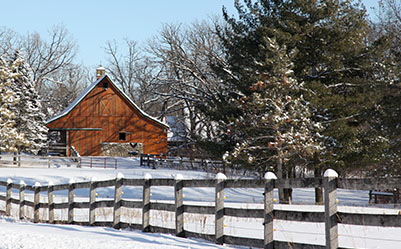Is Your Farm Ready for Winter?
Jan 03, 2023

For many people across the state, last week’s winter storm came as a surprise. After all, it was quite warm during last year’s Christmas! While the temperatures level off for a few days, take the time to inspect your farm and prepare for the upcoming months.
Here is a basic checklist to consider:
Inspect the exterior of your barn and/or shed
Look closely for any type of damage or deterioration to your barn or equipment shed such as loose boards, cracked windows, missing shingles, etc. Winter conditions such as ice can quickly turn a minor issue into a major structural problem. If you noticed drafts in your barn during last week’s storm, now is the time to look for the source and get it fixed.
Check your plumbing system
Enlist the help of a plumber to check that your plumbing system is in working order and properly insulated. Detach and drain your hoses before the temperature falls below freezing again and ensure that all outdoor spigots work. If you have issues lifting buckets that have been filled with water, consider investing in a cart that you can load them onto and pull down the aisle or across the yard. Now may also be a good time to invest in water heaters for your pasture troughs and stall buckets.
Look for fire hazards
Space heaters in tack rooms and equipment sheds have been the unfortunate culprit of many fires. We strongly urge you to ban them from your barn, but if you do decide to use one, ensure that it is never left unattended and is unplugged whenever you leave. Check your barn’s entire electrical system to make sure it can stand up to winter use and have a secondary power source such as a generator on standby in case of an outage.
Have a plan for snow
Of course, some regions of our state get more snow than others, but wherever you live, it is best to be prepared for unpredictable weather. Find a convenient location to store snow supplies such as shovels, blowers, and ice melt so that they are easy to access before the first flurries fall. If you have livestock, keep at least one trailer cleared off at all times in case you must transport an animal in the event of an emergency.
Mitigate mud
Is there a highly trafficked area that turned into a sloppy mess last week? It will only get worse as the season progresses. Mud that accumulates around gates, walkways, driveways, and troughs/feeders can be hazardous for both humans and livestock. Consider laying down some type of absorbent material such as crushed rock, wood chips, or sand before the next rain or snow.
We know the work doesn’t stop just because the weather gets rough. That’s why your local Co-op is here to help with all your winter supply needs, so stop by before the next storm hits.
For more content like this, check out the latest issue of The Cooperator.
Here is a basic checklist to consider:
Inspect the exterior of your barn and/or shed
Look closely for any type of damage or deterioration to your barn or equipment shed such as loose boards, cracked windows, missing shingles, etc. Winter conditions such as ice can quickly turn a minor issue into a major structural problem. If you noticed drafts in your barn during last week’s storm, now is the time to look for the source and get it fixed.
Check your plumbing system
Enlist the help of a plumber to check that your plumbing system is in working order and properly insulated. Detach and drain your hoses before the temperature falls below freezing again and ensure that all outdoor spigots work. If you have issues lifting buckets that have been filled with water, consider investing in a cart that you can load them onto and pull down the aisle or across the yard. Now may also be a good time to invest in water heaters for your pasture troughs and stall buckets.
Look for fire hazards
Space heaters in tack rooms and equipment sheds have been the unfortunate culprit of many fires. We strongly urge you to ban them from your barn, but if you do decide to use one, ensure that it is never left unattended and is unplugged whenever you leave. Check your barn’s entire electrical system to make sure it can stand up to winter use and have a secondary power source such as a generator on standby in case of an outage.
Have a plan for snow
Of course, some regions of our state get more snow than others, but wherever you live, it is best to be prepared for unpredictable weather. Find a convenient location to store snow supplies such as shovels, blowers, and ice melt so that they are easy to access before the first flurries fall. If you have livestock, keep at least one trailer cleared off at all times in case you must transport an animal in the event of an emergency.
Mitigate mud
Is there a highly trafficked area that turned into a sloppy mess last week? It will only get worse as the season progresses. Mud that accumulates around gates, walkways, driveways, and troughs/feeders can be hazardous for both humans and livestock. Consider laying down some type of absorbent material such as crushed rock, wood chips, or sand before the next rain or snow.
We know the work doesn’t stop just because the weather gets rough. That’s why your local Co-op is here to help with all your winter supply needs, so stop by before the next storm hits.
For more content like this, check out the latest issue of The Cooperator.